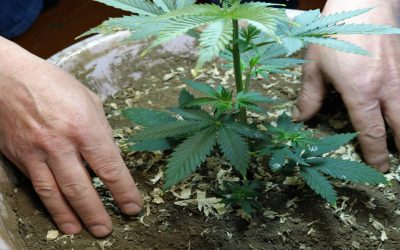In 2012, people in Colorado and Washington said yes to using and selling weed for fun. They were the first states in the U.S. to do this. In the next 11 years, 23 more states, Washington, D.C., and Guam did the same, even though it was still not allowed by the government.
Varieties of the cannabis plant, commonly referred to as marijuana or weed, contain a compound called THC, which induces a feeling of euphoria when ingested or smoked.
Where is weed legal? Presently, there is growing support among many Democrats and some Republicans for the legalization of cannabis. State legislators are grappling with the question of whether to legalize it and how to regulate it, with several bills concerning cannabis introduced in Congress. The House passed a bill on April 1, 2022, to decriminalize cannabis possession, but a comprehensive nationwide legalization bill has yet to gain traction.
In October 2022, President Joe Biden announced plans to pardon individuals convicted of minor cannabis offenses and urged governors to do the same in their respective states. This initiative could benefit approximately 6,500 individuals, although the White House stated that no one is currently incarcerated solely for possessing cannabis.
There are divergent opinions regarding the health and safety implications of cannabis. Some argue against its legalization, citing potential risks to health and public safety, while others contend that it is less harmful than alcohol and may have therapeutic benefits for conditions such as stress and pain.
People who support legalizing marijuana believe it can help states earn more money and fix problems in the justice system. Laws against marijuana have hurt minority communities the most, resulting in many people being sent to jail. Weed legal states are trying to correct this by erasing past convictions for small amounts of marijuana.
A study from December 2022 by the American Medical Association found that even in states where marijuana is technically illegal but not punished severely, making it completely legal reduces the number of people being arrested for it.
What states legalized weed? There are:
- Colorado
- Washington
- Alaska
- Oregon
- Washington, D.C.
- California
- Maine
- Massachusetts
- Nevada
- Michigan
- Vermont
- Guam
- Illinois
- Arizona
- Montana
- New Jersey
- New York
- Virginia
- New Mexico
- Connecticut
- Rhode Island
- Maryland
- Missouri
- Delaware
- Minnesota
- Ohio
In October of 2022, Vermont initiated the sale of marijuana in stores, followed by New York in December of the same year. However, Washington D.C. lacks official regulations for marijuana sales despite its legality, while Guam is gradually establishing outlets for marijuana sales.
Ohio joined the ranks of states legalizing recreational marijuana in November 2023, becoming the most recent state to do so. Conversely, Oklahoma’s attempt to legalize recreational use through a vote on March 7, 2023, did not succeed.
Each state has its unique process for granting licenses to marijuana retailers, a prerequisite for legal sales.
Taxes on marijuana sales vary among states, with some imposing additional excise taxes on marijuana products.
Regulations concerning adult possession limits, personal cultivation rights, and the allocation of tax revenues differ in states with legal marijuana.
Colorado
Colorado approved legalizing marijuana in November 2012. People over 21 can have and share one ounce of marijuana and grow up to six plants each, but homes can only have up to 12 plants regardless of the number of residents. Using marijuana in public is against the law.
In Colorado, buying from licensed stores means paying regular sales tax plus a 10% tax on marijuana. There’s also a 15% tax on the wholesale price.
Washington
Washington also legalized marijuana in November 2012. Adults over 21 can buy and have up to one ounce of marijuana, certain amounts of edibles, liquids, and concentrates. It’s not allowed to use marijuana in public, and people can’t grow it at home for fun.
Licensed stores in Washington sell marijuana, and there’s a 37% tax on those sales.
Alaska
Alaska approved marijuana legalization in November 2014. Adults over 21 can have and share one ounce of marijuana and grow up to six plants, with only three of them being mature. Using marijuana in public is against the law.
In Alaska, licensed stores sell marijuana, and there’s an excise tax paid by the cultivator.
Oregon
In Oregon, a measure was passed in November 2014 legalizing the possession of marijuana for adults over 21. They can have up to an ounce in public and up to 8 ounces at home, along with specific quantities of marijuana products in solid or liquid form. Growing up to four cannabis plants is allowed, but public consumption remains illegal. Marijuana can be purchased at licensed dispensaries, taxed at 17%, with potential additional local taxes of up to 3%.
Washington, D.C.
Similarly, in Washington, D.C., a measure approved in November 2014 permits adults over 21 to possess up to 2 ounces of marijuana and gift up to 1 ounce to another person. They can cultivate up to six plants, with restrictions on mature plants. However, recreational sales are prohibited due to Congressional restrictions, and the market operates through gifting services.
California
In California, a legalization measure passed in November 2016 allows adults over 21 to possess, buy, or give up to an ounce of cannabis or 8 grams of concentrated cannabis. Cultivation of up to six live plants is permitted, with public consumption and consumption in vehicles being illegal. Cannabis retail at licensed dispensaries is subject to state sales and excise taxes, along with potential local taxes.
In Maine, a measure legalizing marijuana was passed in November 2016. Individuals over the age of 21 can now possess and use up to 2.5 ounces of marijuana and cultivate up to six flowering and 12 immature plants.
Maine
In Maine, since November 2016, people who are 21 or older can have and carry up to 2.5 ounces of marijuana and grow a limited number of marijuana plants at home.
Massachusetts
In Massachusetts, also since November 2016, adults over 21 can possess up to an ounce of marijuana and grow a limited number of plants at home. They can also buy marijuana from licensed stores, which are taxed.
Nevada
In Nevada, since November 2016, residents over 21 can have a certain amount of marijuana and grow a limited number of plants at home. They can buy marijuana from licensed stores, which are taxed.
Michigan
Michigan legalized marijuana for adults over 21 in November 2018. People can grow a certain number of plants at home and possess a limited amount of marijuana.
Vermont
Vermont legalized marijuana possession and cultivation for adults over 21 in January 2018. In October 2022, the state began licensing retailers for marijuana sales.
Guam
Guam passed a legalization measure in April 2019, permitting adults aged 21 and above to possess up to an ounce of marijuana and cultivate up to six plants, with a limit of three mature ones. The progress of establishing trading guidelines by Guam’s Cannabis Control Board in early 2020 was halted by the COVID-19 pandemic, but the island has since made strides in developing its recreational market.
Illinois
In Illinois, a legalization measure was approved in May 2019, allowing residents over 21 to have 30 grams of marijuana, 5 grams of concentrated cannabis, and products containing up to 500 milligrams of THC as of January 2020. Non-residents are allowed half these amounts while in the state, with public consumption remaining illegal. Initially, marijuana for adult use could be purchased from licensed dispensaries, followed by a gradual rollout of recreational retail licenses. Taxes are based on THC content, with higher THC products taxed at 25% and lower THC products at 10%. Cannabis-infused products are subject to a 20% tax, with municipalities able to levy up to a 3% tax on sales.
New Jersey
New Jersey joined four recreational weed states in approving marijuana legalization measures on Election Day 2020, with nearly 67% of voters supporting the initiative. Only adults over 21 are permitted to use cannabis, and the existing state commission on medical cannabis oversees the recreational market, which is subject to state and local taxes. Legislation signed on Feb. 22, 2021, formally established the state’s recreational marketplace and reduced penalties for underage possession of marijuana and alcohol.
Montana
Montana also saw legalization measures approved in November 2020, with nearly 57% and 58% of voters supporting initiatives legalizing the possession and use of limited amounts of cannabis by adults over 21.
South Dakota
South Dakota’s Constitutional Amendment A, passed in November 2020, allowing adults over 21 to possess and distribute up to 1 ounce of cannabis, was nullified by the state Supreme Court in November 2021, following a lawsuit backed by the governor.
Arizona
Arizona’s Proposition 207, approved in November 2020, lets adults over 21 use, own, and grow limited amounts of marijuana. It got about 60% support from voters.
New York
In New York, Gov. Andrew Cuomo signed the Marihuana Regulation and Taxation Act in March 2021. People 21 or older can have up to 3 ounces of cannabis for fun. The law also sets rules for selling it and clears past convictions. Legal sales started in December 2022.
Virginia
Virginia passed SB1406 in April 2021, allowing adults 21 or older to have up to 1 ounce of recreational marijuana. They can grow up to four plants. But, there’s no plan yet for selling it legally. The future of the market is uncertain as of January 2023.
New Mexico
New Mexico’s Gov. Michelle Lujan Grisham signed HB2 in April 2021. Adults over 21 can grow cannabis at home and have up to two ounces outside. Licensed stores started selling it in April 2022. People can grow up to six plants per person or 12 per household.
Connecticut
Connecticut legalized recreational cannabis in June 2021 with SB1201, signed by Gov. Ned Lamont. People over 21 can have up to 1.5 ounces and some more at home or in their car. Past minor marijuana crimes were erased. Sales began in January 2023.
Rhode Island
Rhode Island’s legalization measure, sanctioned in May 2022 by Governor Dan McKee, permits adults aged 21 and above to legally possess up to an ounce of cannabis and cultivate up to three plants in their residences. Sales officially commenced in December 2022 under the oversight of a new regulatory body.
Maryland
In November 2022, Maryland voters approved Question 4, allowing adults to possess and use cannabis from July 2023 onwards. Legislation passed by the Maryland General Assembly replaces the term “marijuana” with “cannabis” and permits possession of up to 1.5 ounces. Additionally, measures for expungement and resentencing for certain cannabis-related offenses were introduced.
Missouri
Missouri also saw approval for recreational marijuana legalization in November 2022. The measure permits possession of up to 3 ounces, with provisions for personal cultivation and expungement of non-violent cannabis offenses. Retail sales commenced in February 2023, earlier than anticipated.
Delaware
In April 2023, Delaware’s recreational cannabis bill became law without the signature of Governor John Carney. The law allows residents aged 21 and older to possess up to 1 ounce but prohibits personal cultivation. Separate legislation paves the way for the state’s recreational cannabis industry.
Minnesota
Minnesota joined the ranks of legalized recreational marijuana states in May 2023 under Governor Tim Walz’s approval. The law includes provisions for expungement and creates a regulatory agency for the industry. While decriminalization starts in August 2023, retail sales are scheduled for the first quarter of 2025.
Ohio
Ohio’s legalization measure, passed in November 2023, allows adults to grow plants at home and possess up to 2.5 ounces of cannabis. However, retail dispensaries are yet to be established, with the law set to take effect 30 days after the election. Governor Mike DeWine, despite opposition, expects the implementation to generate revenue while acknowledging concerns about potential harm.
Has the Federal Government Legalized Cannabis?
The government says marijuana is very bad and illegal on the national level. President Biden wants to check quickly if this should change. Some states made it okay to use recreational weed, even though the national government says no. Usually, the national government doesn’t bother much about punishing people for weed in these states. Back in 2009, the Obama government even said prosecutors could let people off if they followed their state’s weed rules.
Description of the Cole Memorandum
In 2013, the Justice Department released a significant memo regarding federal marijuana enforcement, known as the Cole Memorandum. This document stated that the Justice Department wouldn’t contest states’ legalization laws at the time and expected states to implement strong enforcement measures themselves.
However, in 2018, then-Attorney General Jeff Sessions revoked the Cole Memo and instructed prosecutors to rely on established principles and their own discretion when handling marijuana-related charges.
Since then, the Justice Department has generally refrained from pursuing cases where individuals are complying with state laws and hasn’t legally contested state legalization measures. Observers point out that even after the withdrawal of the Cole Memo, most of the Justice Department’s marijuana-related prosecutions have targeted more serious offenses like firearms or organized crime.
Marijuana’s Decriminalization
Decriminalization involves lessening the severity of penalties for a particular criminal activity or reclassifying it as a civil offense. According to the Marijuana Policy Project’s November 2023 data, 31 states and the District of Columbia have decriminalized minor marijuana possession offenses, typically eliminating the possibility of incarceration for first-time offenders, although fines or a criminal record may still apply in certain areas.
Some states have redefined possession of small marijuana amounts as a civil offense rather than a criminal one, while others have merely reduced penalties. However, in most of these states, repeat offenses, as well as sales, distribution, or possession of large quantities of marijuana, can still result in imprisonment. Some of the states that have implemented decriminalization laws also have medical marijuana regulations.
Additionally, two states have decriminalized marijuana without legalizing it in any form, as per the Policy Project’s findings. Decriminalization is often viewed as a compromise between full legalization and harsh punitive drug policies, particularly those that have disproportionately impacted communities of color.
About Allowing Recreational Marijuana
What do people think about allowing recreational marijuana? A lot more Americans are saying yes. A survey in 2022 by CBS News and YouGov showed that about two-thirds of Americans want recreational marijuana to be legal both nationally and in their own state. Another study by Pew Research Center also found many people supporting this idea.
Over time, more and more Americans have become open to the idea. Back in 1969, only 12% of adults in the U.S. were in favor of legalization. But by 2021, that number had gone up to 68%, according to Gallup.
While Democrats tend to support legalization more than Republicans, even many Republicans are now in favor of it, according to Gallup. Younger people, like those under 30, are more likely to support legalization, but even many older Americans, like those aged 50 to 64, are on board, as shown in earlier Gallup surveys.










0 Comments